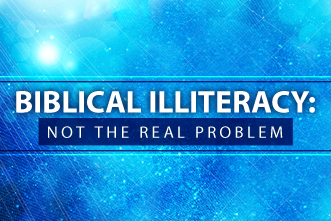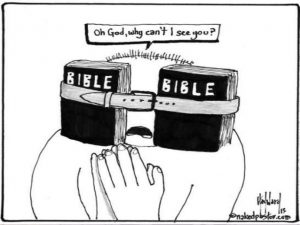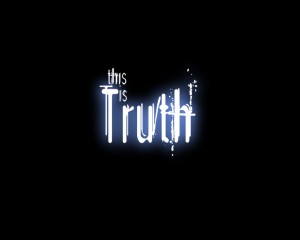It is popular in some Christian circles today to say that “Jesus is our authority; not the Bible.”
Others put it this way: “Jesus is the only Word of God; the Bible is not the Word of God.”
Some will even accuse you of “bibliolatry” (making the Bible an idol) if you believe that the Bible is the Word of God and is inspired, inerrant, and authoritative.
One author I recently read even accuses Christians of treason against Jesus Christ for thinking that the Bible is the Word of God.
I understand the concern, and I agree that bibliolatry is indeed a danger, but the question must nevertheless be asked, “If not for the Bible, how would we know about Jesus?”

Engage in a little thought experiment with me.
Let’s Assume Jesus is the ONLY Authority
Let us assume for a moment that Jesus is the only Word of God. That only Jesus is authoritative in revealing God to us, showing us how to live, and telling us what God wants, desires, and expects from us.
This is not hard to assume, because it is true.
But now, in your mind, get rid of everything you know about Jesus that comes from the Bible. If possible, try to wipe your mind of every detail, idea, fact, or thought about Jesus which has its origin in Scripture.
Now that you have done this, how much do you know about Jesus?
The answer is: nothing.
Sure, you might have some oral legends and myths that have been passed down through time for 2000 years, but how reliable and authoritative do you think these would be?
Without the Bible, we would have nothing authoritative to say about Jesus, and therefore, no firm foundation on which to base our Christian teachings and ideas.

We NEED an authoritative Bible so that we Can Follow our sole Authority, Jesus
For the Christian faith to be authoritative, we need eyewitness accounts of what Jesus said and how Jesus lived, and this is what we have in Scripture, primarily in the four Gospel accounts of Matthew, Mark, Luke, and John.
So is the Bible the Word of God? I would unequivocally say “Yes, it is.”
But since Jesus is my authority, I agree with Jesus that the Scriptures are authoritative only as long as they point us to Jesus. He said to the religious leaders of His day that they search the Scriptures daily because they think that in them they have life, but these Scriptures actually point to Jesus (John 5:39).
We cannot follow the authority of Jesus without the authority of Scripture, for Scripture teaches us and informs about Jesus.
So when it comes to the Christian authority, I have no qualms in saying that our authority is the Word of God. (Of course, it is important to also consider how the Bible is authoritative.) And by this, I mean that our authority is the written Word of God (the Bible) as it points us to the living Word of God, Jesus. We cannot have one without the other.

So BOTH Jesus and Scripture are Authoritative
We cannot have the authority of Jesus without the authority of Scripture.
In my forthcoming book, God’s Blueprints for Church Growth, I write this:
Chester McCalley, a pastor in Kansas City, Missouri was asked one Sunday by some visitors if they could see the church constitution. He noticed they were carrying their Bibles, so he told them, “You have it in your hands. Our church is governed by the Word of God.”
This pastor was correct, and yet a careful distinction must be made. While I have no issue with calling the Bible “the Word of God,” we must remember that the Bible is the Word of God only when we use it to teach others about the only true Word of God, Jesus Christ.
Jesus Christ is the Word, and the Bible can help us understand Jesus as the Word only so long as we remember that the Bible points to and teaches about Jesus. Jesus Himself chided the Bible experts of His day for diligently studying the Scriptures while not seeing that they pointed to Him (John 5:39).
If we learn, study, and teach Scripture just so we can learn more about Scripture, we have lost our way, and are not actually studying the Word of God. If you are studying the Bible and it is not pointing you to Jesus, then you are not truly studying the Word of God.
The Bible is only the Word of God when our study of it points us to Jesus, who is the Word of God.
And the great thing about both Jesus and Scripture being authoritative is that these two authorities do not contradict or disagree with each other (when both are properly understood).
So since I strive to be a faithful and committed follower of Jesus, I search the Scriptures daily, so that in them and through the authority of Scripture, I might be pointed to Jesus, my sole and ultimate authority.
If you want to see how I work some of this out, try one of books or start listening to my podcast.
This post is part of the June Synchroblog on the topic of authority. Here are the other contributors for this month:
- Authority for Believers – Soulcare Ministries
- Christian Authority – Done With Religion
- Who Gets To Say What Is Right Or Wrong? – What God May Really Be Like
- A Surprising Source of Spiritual Authority – Glenn Hager
- Surrendering Our Authority To Jesus – K. W. Lesley
- Under Who’s Authority – Layman Seeker
- Authority? – Metler
- The Age of the Spirit – Liz Dyer




 The problem is not a lack of biblical literacy; the problem is a lack of biblical living and loving, and to be honest, you don’t need to know much about the Bible in order to live and love like Jesus.
The problem is not a lack of biblical literacy; the problem is a lack of biblical living and loving, and to be honest, you don’t need to know much about the Bible in order to live and love like Jesus. 

 One example: Is God on the side of Hillary Clinton or Donald Trump? With either choice, you can find seminary-trained pastors and Bibles scholars who support one candidate or the other and use the Bible to do so, while accusing the other side of being biblically illiterate. I saw a post on Facebook the other day from a popular Northeastern Pastor who basically said, “How can any evangelical Christian support the racist, bigoted Donald Trump? Don’t you know what the Bible says?” And then he went on to quote some Bible verses which he thought should sway people to vote for Hillary.
One example: Is God on the side of Hillary Clinton or Donald Trump? With either choice, you can find seminary-trained pastors and Bibles scholars who support one candidate or the other and use the Bible to do so, while accusing the other side of being biblically illiterate. I saw a post on Facebook the other day from a popular Northeastern Pastor who basically said, “How can any evangelical Christian support the racist, bigoted Donald Trump? Don’t you know what the Bible says?” And then he went on to quote some Bible verses which he thought should sway people to vote for Hillary. Those questions are somewhat of a caricature of the real biblical literacy tests, but they’re not too far off.
Those questions are somewhat of a caricature of the real biblical literacy tests, but they’re not too far off. One big question I’ve been mulling over for the past five years or so is this “Is there such a thing as a SINGLE biblical world view, and even if so, is it a worldview that everyone should adopt? Is it the RIGHT worldview?” I am not sure the answer is “Yes” to either question.
One big question I’ve been mulling over for the past five years or so is this “Is there such a thing as a SINGLE biblical world view, and even if so, is it a worldview that everyone should adopt? Is it the RIGHT worldview?” I am not sure the answer is “Yes” to either question.


 Or take prophecy. Are prophetical statements about future events true? Well, they do reveal divine intent, and since God can bring about what He intends, we could say that prophetical statement are more true than the statements about any human intent, but again, are statement about future historical events actually true before they occur?
Or take prophecy. Are prophetical statements about future events true? Well, they do reveal divine intent, and since God can bring about what He intends, we could say that prophetical statement are more true than the statements about any human intent, but again, are statement about future historical events actually true before they occur? 



 I am quite hesitant to begin blogging through my seminary class notes on Bibliology — the Study of the Bible.
I am quite hesitant to begin blogging through my seminary class notes on Bibliology — the Study of the Bible.